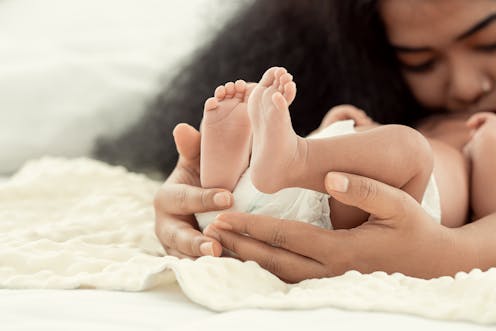
Up to one in four African girls have their first child before the age of 18. Becoming a mother at such a young age can lead to mental health problems like depression. Research suggests that pregnant and parenting teenagers have poorer mental health than adult mothers.
Several factors make teenage mothers vulnerable to mental illness. For example, in conservative societies pregnant, unmarried adolescent girls are shamed and excluded. Parenting is stressful. Early and unintended pregnancy can add to the pressure. Moreover the loss of childhood can overwhelm and distress adolescent girls.
Adolescent mothers from poor homes and communities are at even higher risk of depression. These girls experience social inequality, chronic stress, violence and food insecurity. When teenagers become mothers, their adversities are compounded.
Several studies have looked at drivers of depression among adolescents in general. But there is scant attention to the mental wellbeing of pregnant and parenting adolescent girls in Africa. Scant research means limited programme or intervention focus. Limited attention means there is a missed opportunity to address poor mental health in this group. Pregnant and parenting adolescents face different challenges from their peers who are not pregnant or parenting.
Our recent study estimates the level of probable depression among pregnant and parenting girls in Burkina Faso in West Africa and Malawi in southern Africa. We chose these countries because they showed potential for policy change around adolescent sexual and reproductive health.
We used the Patient Health Questionnaire-9, the tool used in diagnosing depression. But only a clinician can ultimately decide if an individual has depression. We thus classify those in this study who met the clinical criteria for depression as probably depressed.
We explored the factors associated with a higher likelihood of depression. We found that depression was highest among girls who experienced sexual, emotional and physical violence from their partners; whose partners denied paternity or refused to provide any support; who received no support from their community; who described their neighbourhood as unsafe.
Our study showed that the prevalence of probable depression in Burkina Faso was 18.8%. In Malawi it was 14.5%. But cases of depression were undiagnosed and untreated. This could have dire implications for the health and wellness of the girls and their babies.
Our study
We interviewed 980 adolescent girls in Ouagadougou, Burkina Faso, and 669 girls in Blantyre, Malawi in 2021. We asked them how often they had faced the following problems over the last two weeks: having little interest or pleasure in doing things; feeling down or hopeless; having insomnia or oversleeping; fatigue; loss of appetite or over-eating; having low self-esteem; trouble concentrating; restlessness or slowness; and negative self-thoughts, including self-harm.
We also collected information on the girls’ families, partners and neighbourhoods.
Burkina Faso:
Birth status was the only individual factor associated with probable depression in Burkina Faso. Girls who had already given birth were 35% less likely to report depression compared to girls currently pregnant. This group of girls might have had time to develop coping mechanisms after experiencing the disappointment of early and unintended pregnancy.
Girls exposed to intimate partner violence were twice as likely to report depression compared to those who were not.
One key result of our study in Burkina Faso was that paternity denial was a major risk factor for depression among young girls. Paternity denial brings shame to the girl. It also means she receives no support from her partner in taking care of the child, unlike her married counterparts. Acceptance of paternity can help girls deal with the disappointment of becoming pregnant too early and the fear of facing shame and child upbringing alone. Girls whose partners denied paternity were blamed for sleeping around and their children were deemed illegitimate. The pressure from parents on the girls to identify the person responsible for their pregnancy could result in girls’ prolonged sadness and loss of interest in living.
Consistent with previous research, we found that girls who got support from their parents and partners were shielded from depression. Having access to support within the community was related to a lower likelihood of depression. Also, having goodwill from neighbours and the community was linked to a lower likelihood of depression.
Malawi:
Having secondary education level was substantially linked to a lower likelihood of reporting depression in Malawi. The explanation for this is likely that girls with some secondary education may be more optimistic about future job prospects than girls with no or simply elementary education. Other research done in Malawi has shown education as having a protective effect against depression. Generally, higher education in Malawi is associated with more favourable employment possibilities than having no schooling or only primary schooling.
Exposure to intimate partner violence was associated with a higher risk of depression.
Here, too, we found that girls who got support from their parents and partners were shielded from depression. Young mothers need a lot of support to navigate their new role as parents. Childcare can be tedious even for adults, and requires a lot of money, which these girls lack. Having access to adequate support from parents and partners can lessen the burden of childcare and help girls build their resilience, determination and self-esteem. Girls who considered their neighbourhood to be safe were less likely to report depression.
Thinking ahead
Depression is common among pregnant or parenting adolescent girls.
Because depression can harm a girl’s health, routine depression screenings at prenatal and postpartum visits are crucial.
Health systems should be strengthened by governments and developmental partners to develop and provide therapy that addresses all areas of vulnerabilities linked to depression in pregnant and parenting girls.
Anthony Idowu Ajayi receives funding from SIDA and IDRC. He is affiliated with African Population and Health Research Center.
Elita Chamdimba is affiliated with Centre for Social Research, UNIMA and University of Strathclyde.
This article was originally published on The Conversation. Read the original article.







